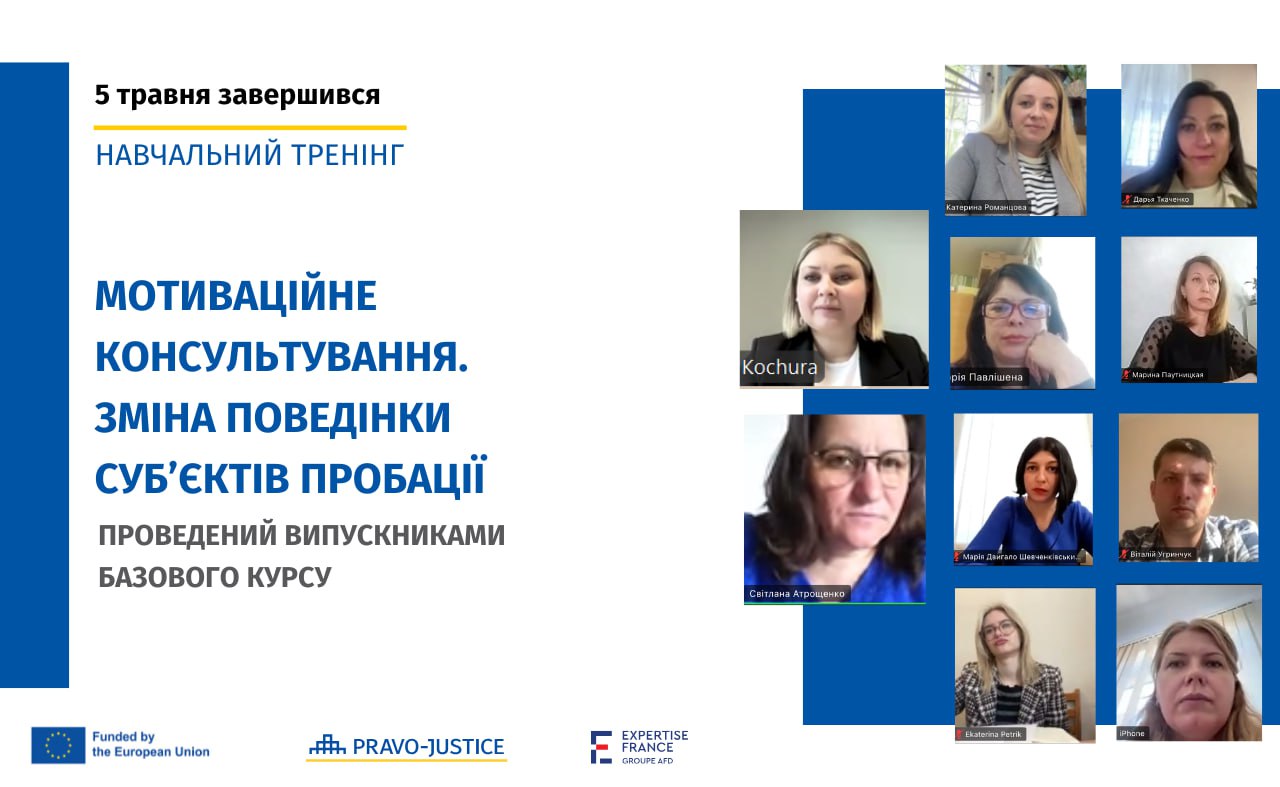Olena Kochura, EU Project Pravo-Justice Expert, Facilitated a Training Session on Motivational Counselling for Probation Officers

Training course “Motivational Counselling. Changing the Probation Clients’ Behaviour”, developed on the initiative and with expert support from EU Project Pravo-Justice, is being rolled out nationwide. On 5 May, the first practical training session for probation officers was completed. Mentor-trainers Yuliia Cherednyk and Svitlana Atroshchenko, graduates of the initial basic webinar, delivered the training session. Olena Kochura, Key Expert on Reforming the Penitentiary System and Probation at EU Project Pravo-Justice, facilitated the event.
“We see that the course participants are not just learning new tools – they are developing a new perspective on their work. The training empowers them to support probation clients on their path toward change. Rolling out the course is an important step toward building a professional, efficient, and impact-driven probation system,” said Olena Kochura.
The training will help participants gain a deeper understanding of the key principles of motivational counselling and develop the practical skills they need to work effectively with probation clients. In particular, they mastered the basics of effective communication and the concept of the stages of behavioural change, learned the principles of motivational counselling and active listening and reflection techniques, as well as how to work with probation clients’ resistance to change.
“Training in motivational counselling is the foundation of effective work with probation clients. Understanding the stage of change a person is going through and how to work with it helps you build the right interaction strategy. These skills are useful not only in working with probation clients, but also in everyday life – they give you a deeper understanding of how people around you behave and this skillset helps you support others without being pushy,” said Yuliia Cherednyk, lead specialist at the Department of Psychological Support and Innovation of the Probation Centre.
The training placed special emphasis on methods for overcoming resistance and ambivalence among probation clients, setting SMART goals, and utilising tools for assessing motivation to change. Practising assertive communication skills in various professional interactions also figured prominently in the training.
“In their work with convicts, probation officers often face resistance. The tools the participants learned about at the training will not only help them overcome this resistance but also give their clients a chance for a fresh start. Understanding the stages of change makes it easier to interpret the probation clients’ actions and develop individual support strategies,” said Svitlana Atroshchenko, Head of the Psychological Support and Innovation Sector at the Probation Centre.
At the end of the training, participants took a test, and 22 out of 23 successfully passed it and obtained certificates.
We would like to remind you that between February and April, EU Project Pravo-Justice experts delivered a basic course on motivational counselling for three groups of probation mentor-trainers. After completing the final test, 59 participants obtained certificates attesting to their acquired knowledge and skills. Going forward, these graduates will deliver similar training courses in the regions under the mentorship of the Project experts.
According to the Implementation Plan pursuant to the Strategy for Reforming the Penitentiary System until 2026, it is planned that at least 30% of probation officers will complete training in motivational counselling this year.